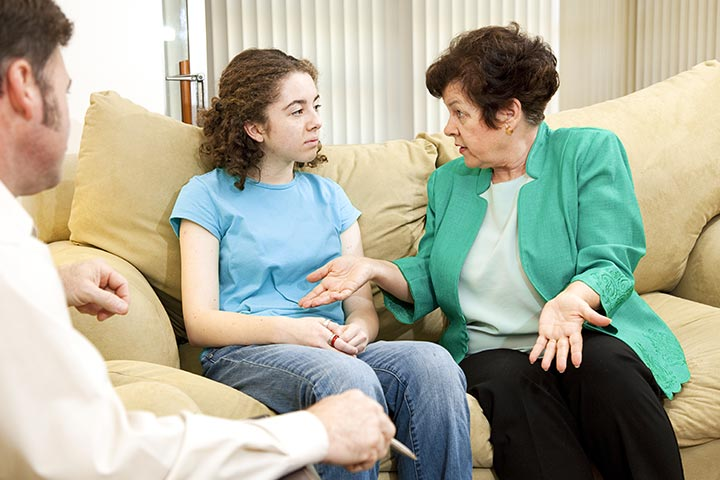Some parents do not allow their children to express their opinion or participate in a family discussion, while others open the doors to dialogue in front of their children without borders and even engage with them in areas considered “older than their age” as a matter of adopting modern education based on openness and opinion. Democrat.
Between both of them, there is a neutral group that legitimizes dialogue within its limits and engages its children in thoughtful discussions with the aim of penetrating the inner worlds of its child and thus establishing an effective dialogue that simulates his different age stages, his dialogue abilities, his skills in participation, expressing an opinion, and even expressing his opinion, while clarifying the faults and the rightness.
Should we participate with our children in our family discussions, and what are the limits and axes of this participation, and what are its pros and cons?
The foundations of dialogue and consultation must be laid gradually
Dr. Ahmed Eid, a psychologist and head of the psychological counseling department at the International Knowledge School, explains, “If the system in the home is characterized by democracy, the mother gives the child two options for food to choose his favorite dish or his favorite outfit without trying to impose her opinion on him, and this is the beginning of socialization where I give my child a space to participate and train him to listen, which is the way to establish an active and positive dialogue.” Childhood is the foundational stage. “In his early years, I establish dialogue with him according to his concepts and abilities, and provide him with options, whether to go to the garden or take a vacation, and try to find out the motives behind his choice of something rather than others, and train him in giving and taking so that I cannot wait for him to grow up and suddenly invite him to the dialogue table to train him.” ».
Therefore, the foundations of dialogue and consultation must be laid gradually and training. “I do not punish the child when he expresses his opinion, even if what he said contradicts some of the values he was brought up on, and I give him the opportunity to listen, discuss his opinion and amend it. Punishment limits or stops dialogue, while openness to the child’s opinion enhances confidence in himself and makes him feel that he is a desirable child, away from framing him in terms of fault, forbidden and wrong.
In the same context, calmness must prevail. “If I scream loudly, the child reflects a negative reaction and weakens his personality to be either rebellious or stubborn and afraid, and even closes the doors of participation in any discussion in order to avoid entering into a whirlpool of anger and screaming.”
Dr. recommends. Eid is to listen to our children. The main goal of the dialogue is to know his way of thinking, to enter his world calmly, and to give him the opportunity to express his opinion and come down to his level.”
It is necessary to choose the topics of discussion appropriate to the age and thinking of the child
Shahira Sami, a behavior modification specialist and director of the “I and My Child” center for training and development of talents and skills, supports the participation of children in family discussions within the limits of “the age, the topics in which we involve children, their intellectual level and their ability to comprehend, as the father and mother must, before taking the step, Determine the goal of the discussion and what they want to teach their children and establish understanding, away from involving them in disputes as this is not an educational goal.
These goals are activated through discussion: “Participation enhances his ability to dialogue, communicate, and form his personality, gaining him confidence in himself and taking responsibility at an early age. expressing his opinion and teaching him the skills of discussion and the skills of respecting the role and listening and elevating his ideas, and it is an opportunity to interfere in his interpretations and turn them into logical explanations by entering his world and moving to my world by helping him to logical analysis and get out of his imaginary world.
She explains, "As a father, I must be patient and listen, teach him discussion skills and enjoy them before him, discuss with him in a low voice, respect his role in speaking and listen to reach the desired goal of the dialogue, in light of exchanging opinions and notifying the child that he is a responsible and decision-maker away from instructions and orders."
Involving the child in discussions grades according to age, explains Sami, “The older he is, the more responsibilities are assigned to him. At the age of 12 and above, the discussion can result in assigning responsibility to the child. For example, a discussion about expenses and financial management, our children can be involved in a discussion of a future plan in this aspect. And crystallizing all the opinions of family members and assigning tasks and responsibilities to each of them and even setting up a financial plan by one of the sons and writing down the expenses.
Sami summarizes, “As a mother and father, I must know exactly the topics in which I can open the door to discussion with the child or not, and keep pace with the age, time and age, especially in the teenage years, where hormonal changes and fluctuating feelings, and as involving the child in my world at this stage is not an easy thing. It must establish the debate and not impose any opinion on it and not be tainted by any kind of intensity and violence, and promote dialogue by assigning it real responsibilities.”
https://www.kulalusra.ae/better-life/family/2022/05/29/8313692?fbclid=IwAR34OtjoJaI_y-M6yFw7Odn5yzJX208-ASwejSa2SwkhpfFB6K9T31uJ1mE




